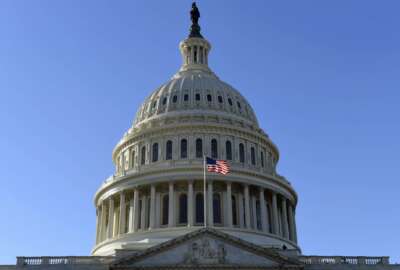
Sexual harassment training now required for House members and staff
In today's Federal Newscast, a resolution is approved in the House requiring the training happen within 180 days after this Congress' second session begins.
To listen to the Federal Newscast on your phone or mobile device, subscribe on PodcastOne or iTunes.
- House lawmakers and staff are now mandated to complete sexual harassment prevention training. The House approved a resolution requiring the training to happen within 180 days after the second session of the current Congress begins. Going forward, the House Administration Committee will issue regulations requiring training within 90 days of any new session. (Congress.gov)
- The White House’s 24/7 veterans hotline is now fully staffed and up and running. Ninety percent of call agents are veterans themselves or family members of veterans. The call center is located in Shepherdstown, West Virginia. It soft-launched back in October and has answered about 10,000 calls since then. (Veterans Affairs)
- The Senate Veterans Affairs Committee passed its version of a new community care program for veterans. The Caring for Our Veterans Act would designate $1 billion dollars to VA, and $3 billion for community care programs. It also extends caregiver benefits to veterans of all eras. Committee leadership is expected to move the bill quickly to the full Senate. (Senate Veterans Affairs Committee)
- The VA said it’s taking corrective action after an audit blasted its heath care administrators for failing to properly oversee dangerous doctors. Among other changes, the department said it will discipline managers who enter into agreements that let poor-performing doctors resign or retire without having their malpractice or malfeasance reported to a national database. The changes came after a GAO audit found administrators were routinely failing to report problematic physicians, that hospitals weren’t adequately investigating concerns about doctors’ professional competence, and that VA’s headquarters wasn’t adequately overseeing the disciplinary process. (Federal News Radio)
- Looking to make your cell network faster? The Navy is working on a new policy to make it easier for network providers to get their service on bases. The policy will also look at small-cell, private networks for remote bases or for operating in war zones. (Federal News Radio)
- Another agency has suffered a major data breach. More than 246,000 current and former employees at the Homeland Security Department have another data breach to worry about. USAToday first reported that a former employee of the inspector general’s office unlawfully took the names, Social Security numbers and dates of birth of employees, as well as 159,000 case files. An IG spokeswoman confirmed to Federal News Radio that the incident didn’t stem from a cyber attack by external actors. Additionally, evidence indicates that the employees’ personal information was not the primary target of the data breach. The spokeswoman adds the responsible individuals are no longer on the OIG’s payroll. (USAToday)
- One member of Congress wants to continue the Trump administration’s efforts to reduce unnecessary agency regulations. Rep. Mark Meadows (R-N.C.) introduced the Lessening Regulatory Costs and Establishing a Federal Regulatory Budget Act. The bill would make agencies set up task forces to make the reduction of burdensome rules permanent, and also require the Office of Management and Budget director to publish an annual regulatory agenda. The House Oversight and Government Reform Committee will mark up the bill today. (Federal News Radio)
- A Cabinet secretary has defended his plan to overhaul his department top-to-bottom. Secretary Rex Tillerson has challenged the notion that the State Department’s traditional level of spending is sustainable. He said it would be very difficult to do it well. Speaking at the Wilson Center, Tillerson bristled at the idea he’s planning to hollow out the State Department, saying the numbers attributed to him are false. He said some budget cuts will result from foreign successes where State can scale back. (Wilson Center)
- Tough decisions lay ahead for the Federal Aviation Administration when it comes to drones. Unmanned aircraft advocates told a House Transportation subcommittee the U.S. is falling behind in the technology because of regulations. Meanwhile, a new FAA study found the devices are more dangerous than bird strikes when they collide with planes. (House Transportation and Infrastructure Committee)
Copyright © 2025 Federal News Network. All rights reserved. This website is not intended for users located within the European Economic Area.
Eric White
Eric White is news anchor and Federal Drive producer at Federal News Network.
Follow @FEDERALNEWSCAST
Related Stories
Related Topics



